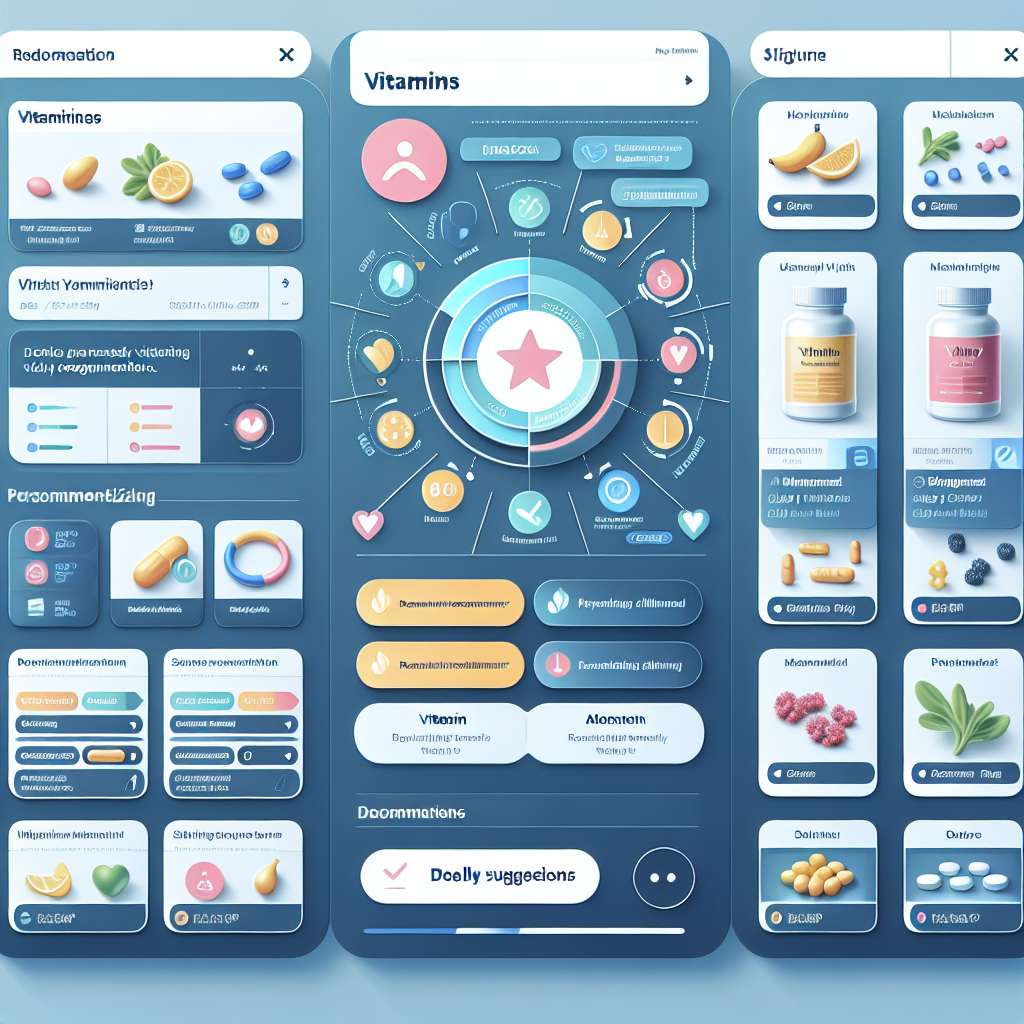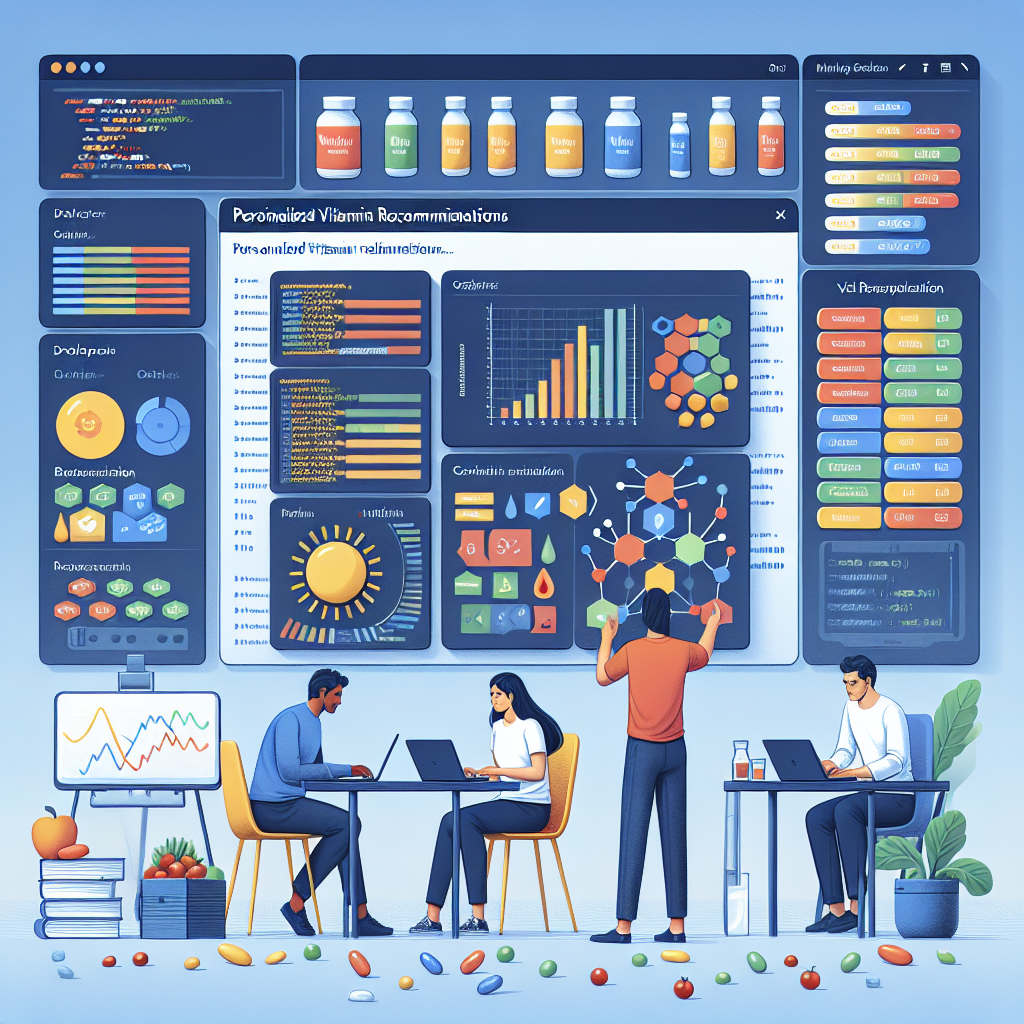Coding Solutions for Personalized Vitamin Recommendations

Discover the power of personalized vitamin recommendations through our innovative coding solutions. Start your journey towards better health today. Click here to learn more.
Implementing Machine Learning for Personalized Vitamin Recommendations
In the rapidly evolving world of health and wellness, personalized vitamin recommendations have emerged as a revolutionary approach to meet individual nutritional needs. This innovative concept is powered by the integration of coding solutions, particularly machine learning algorithms, which are designed to analyze a person’s unique health data and provide tailored vitamin recommendations.
Machine learning, a subset of artificial intelligence, is a method of data analysis that automates analytical model building. It uses algorithms that iteratively learn from data, allowing computers to find hidden insights without being explicitly programmed where to look. In the context of personalized vitamin recommendations, machine learning algorithms can analyze a vast array of health data, including dietary habits, lifestyle choices, genetic information, and medical history, to generate a unique vitamin profile for each individual.
The first step in implementing machine learning for personalized vitamin recommendations involves data collection. Health data can be gathered through various means, such as online questionnaires, wearable health trackers, and genetic testing kits. This data is then fed into the machine learning algorithm, which begins the process of data analysis.
The machine learning algorithm uses statistical techniques to identify patterns and correlations within the health data. For instance, it might find that individuals with a certain genetic marker require higher levels of a particular vitamin, or that a specific lifestyle habit is associated with a deficiency in a certain nutrient. These insights are then used to generate a personalized vitamin recommendation.
One of the key advantages of using machine learning for personalized vitamin recommendations is its ability to handle large volumes of data and complex relationships. Traditional methods of nutritional analysis often struggle with the sheer amount of data and the complexity of the relationships between different factors. Machine learning algorithms, on the other hand, thrive in these conditions, making them ideally suited to the task.
Moreover, machine learning algorithms are capable of continuous learning. As more health data is collected and analyzed, the algorithm becomes increasingly accurate in its predictions. This means that the personalized vitamin recommendations can be continually updated and refined, ensuring that they remain relevant and effective as a person’s health needs change over time.
However, it’s important to note that while machine learning offers significant potential for personalized vitamin recommendations, it’s not without its challenges. Data privacy is a major concern, as individuals must be willing to share their personal health data. Additionally, the accuracy of the machine learning algorithm is dependent on the quality of the data inputted. Therefore, it’s crucial to ensure that the health data collected is accurate and comprehensive.
In conclusion, the integration of coding solutions, particularly machine learning algorithms, offers a promising avenue for personalized vitamin recommendations. By analyzing a person’s unique health data, these algorithms can generate tailored vitamin profiles that cater to individual nutritional needs. As technology continues to advance, we can expect to see even more sophisticated and accurate personalized vitamin recommendations, paving the way for a new era of personalized health and wellness.
Exploring Coding Techniques for Creating a Personalized Vitamin Recommendation System

In the era of personalized healthcare, the concept of personalized vitamin recommendations has gained significant traction. This innovative approach tailors vitamin and supplement intake to an individual’s unique health profile, lifestyle, and dietary habits. The development of such a system, however, requires a sophisticated blend of health science and technology, particularly coding. This article explores the coding techniques that can be employed to create a personalized vitamin recommendation system.
The foundation of a personalized vitamin recommendation system lies in the collection and analysis of user data. This data can range from basic information such as age, gender, and weight, to more complex data like genetic information, dietary habits, and lifestyle choices. To handle this vast amount of data, a robust database management system is required. SQL (Structured Query Language) is a popular coding language used for managing and manipulating databases. It allows for the efficient storage, retrieval, and manipulation of user data, making it an ideal choice for our system.
Once the data is collected and stored, the next step is to analyze it to generate personalized recommendations. This is where machine learning algorithms come into play. Machine learning, a subset of artificial intelligence, uses statistical techniques to give computers the ability to learn from data. Python, with its extensive libraries like Scikit-learn and TensorFlow, is a widely used language for implementing machine learning algorithms. These libraries provide pre-built functions for various machine learning algorithms such as decision trees, random forests, and neural networks, which can be used to analyze the user data and generate personalized vitamin recommendations.
However, the task doesn’t end at generating recommendations. The system also needs to interact with the user, presenting the recommendations in an understandable and appealing manner. This is where front-end development comes into the picture. HTML, CSS, and JavaScript are the cornerstone technologies for web development. HTML (HyperText Markup Language) is used to structure the content on the web, CSS (Cascading Style Sheets) is used for styling this content, and JavaScript is used to make the web pages interactive. Together, they can be used to create a user-friendly interface for our system.
Moreover, the system should also be able to adapt to changes in the user’s lifestyle, dietary habits, or health conditions. This requires the system to learn continuously from new data, a concept known as online learning in machine learning parlance. Python, with its libraries like PyTorch and Keras, provides functionalities for implementing online learning.
In conclusion, the creation of a personalized vitamin recommendation system is a multidisciplinary task that requires a blend of various coding techniques. SQL can be used for managing the user data, Python and its libraries can be used for analyzing this data and generating recommendations, and HTML, CSS, and JavaScript can be used for presenting these recommendations to the user. Furthermore, Python can also be used for implementing online learning to ensure that the system adapts to changes in the user’s profile. By leveraging these coding techniques, we can create a system that not only provides personalized vitamin recommendations but also contributes to the larger goal of personalized healthcare.
The Role of Data Science in Developing Personalized Vitamin Recommendations
The advent of data science has revolutionized numerous sectors, including healthcare and nutrition. One of the most intriguing applications of data science in these fields is the development of personalized vitamin recommendations. This innovative approach leverages coding solutions to analyze individual health data and provide tailored nutritional advice, thereby enhancing overall wellness.
Data science, at its core, is the extraction of meaningful insights from vast amounts of data. It employs a combination of statistical, mathematical, and computational techniques to interpret, manage, and utilize data effectively. In the context of personalized vitamin recommendations, data science plays a pivotal role in analyzing individual health data and determining the specific nutritional needs of each person.
The process begins with the collection of health data from individuals. This data can include information about a person’s age, gender, weight, height, lifestyle, dietary habits, and medical history. Advanced coding solutions are then used to store, manage, and analyze this data. These solutions employ sophisticated algorithms and machine learning techniques to identify patterns and correlations within the data.
For instance, a coding solution might identify a correlation between a person’s age and their need for a particular vitamin. It might also detect a pattern indicating that individuals with a certain lifestyle or dietary habit require more of a specific nutrient. These insights are invaluable in determining the unique nutritional needs of each person.
Once these patterns and correlations have been identified, the coding solution can generate personalized vitamin recommendations. These recommendations are tailored to each individual’s specific needs, taking into account their unique health data. This personalized approach ensures that each person receives the optimal combination of vitamins to support their overall health and wellness.
Moreover, these coding solutions can continually update and refine these recommendations as new data becomes available. For example, if a person’s lifestyle or dietary habits change, the coding solution can adjust their vitamin recommendations accordingly. This dynamic approach ensures that the recommendations remain relevant and effective over time.
The use of data science in developing personalized vitamin recommendations also has significant implications for the healthcare industry. By providing individuals with tailored nutritional advice, healthcare providers can help prevent nutrient deficiencies and promote overall health. This can lead to improved patient outcomes and a reduction in healthcare costs.
Furthermore, this approach can also empower individuals to take control of their own health. By understanding their unique nutritional needs, individuals can make informed decisions about their diet and lifestyle. This can lead to improved health and wellness, and a greater sense of personal empowerment.
In conclusion, the role of data science in developing personalized vitamin recommendations is both significant and transformative. By leveraging advanced coding solutions, data science can analyze individual health data and generate tailored nutritional advice. This innovative approach not only enhances overall wellness but also empowers individuals to take control of their own health. As data science continues to evolve, we can expect to see even more exciting applications in the field of personalized nutrition.